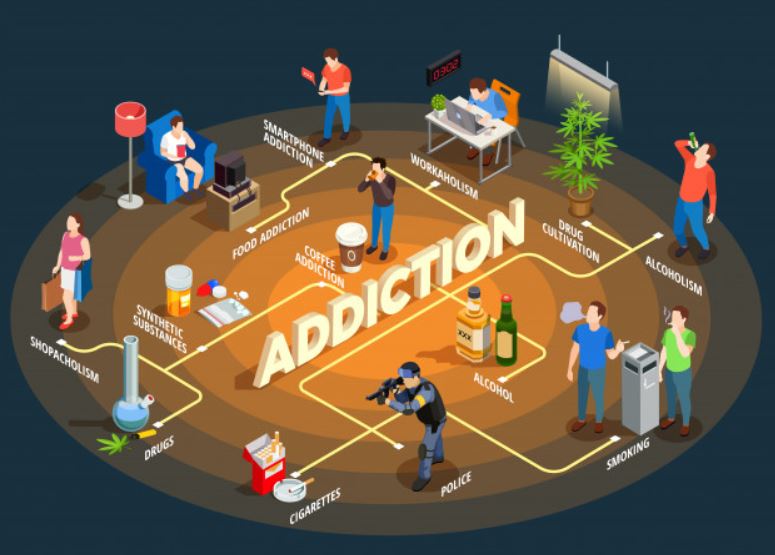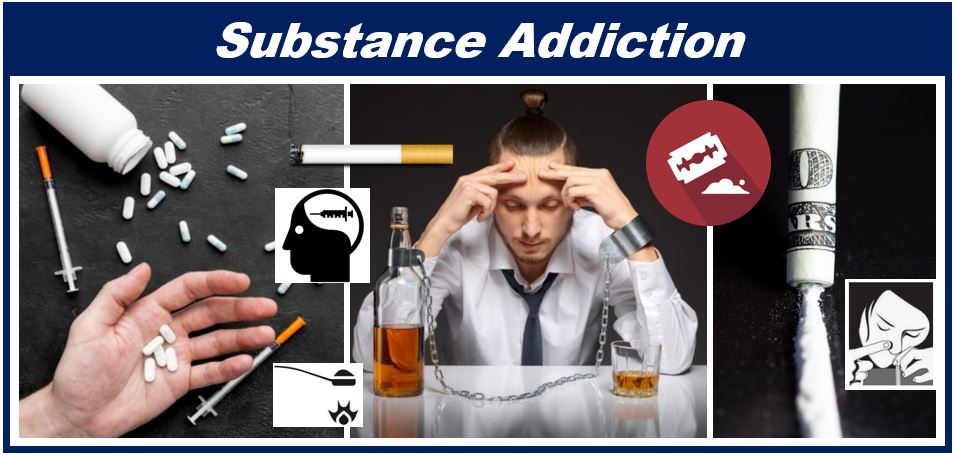Addiction is the condition of being addicted to or dependent on an activity, substance, or thing. Somebody living with addiction has a chronic, compulsive, psychological, or physiological need for a habit-forming behavior, activity, or substance which is harmful.

It is a complex condition, which most psychiatrists describe as a brain disease. People who are addicted to a substance have severe substance use disorder. They have an intense and continuous focus on consuming alcohol, drugs, or other substances. Their addiction may eventually take over their lives completely.
An addict or person living with addiction will keep using a substance or taking part in certain activities even though they know how harmful they are. Gambling is an example of an activity (non-substance) that for some people may become an addiction.
ASAM (American Society of Addiction Medicine) has the following definition of the term:
“Addiction is a treatable, chronic medical disease involving complex interactions among brain circuits, genetics, the environment, and an individual’s life experiences. People with addiction use substances or engage in behaviors that become compulsive and often continue despite harmful consequences.”
Substance addiction

Individuals with a substance abuse disorder suffer from distorted behaviors, cognitive processes, and function.
According to the American Psychiatric Association:
“Changes in the brain’s wiring are what cause people to have intense cravings for the drug and make it hard to stop using the drug. Brain imaging studies show changes in the areas of the brain that relate to judgment, decision making, learning, memory and behavior control.”
Some addictive compounds can trigger significant and harmful changes in how the human brain functions. Even when the effects of the substance have gone, these changes may continue for a long time.
According to the UK’s National Health Service (NHS), you do not necessarily have to be taking a substance every day to have an addiction problem. If you have attempted to stop, for example, taking cocaine, but don’t or can’t, that is a sign of addiction.
The NHS makes the following comment:
“There are lots of reasons why addictions begin. In the case of drugs, alcohol and nicotine, these substances affect the way you feel, both physically and mentally. These feelings can be enjoyable and create a powerful urge to use the substances again.”
Non-substance addiction
Individuals may be addicted to work, computer games, online social media platforms, gambling, the Internet, and many other activities:
Internet
Internet addiction, which includes eSports (online games), social media, and some other online activities, has grown significantly over the past two or three decades.
Millions of people across the world spend many hours each day online to such an extent that they neglect other aspects of their lives. Other aspects may include their families, work, cleaning their homes, etc.
Work
Being a workaholic is not always a choice. If you work hard and become successful, but also have hobbies, spend time with your loved ones, enjoy vacations and weekends off regularly, you probably do not have an addiction problem.
However, if your social life, family life, and physical health are seriously affected, you are probably addicted to your work.
Shopping
If you buy things you don’t need just for the buzz the experience gives you, you may have a problem. Typically, the shopaholic has feelings of despair, guilt, or shame not long after their purchase.
Gambling
Gambling disorder, compulsive gambling, or problem gambling refer to the uncontrollable urge to keep placing bets in spite of their damaging effects on the sufferer’s life.
Betting can stimulate the reward system of the brain of susceptible people, much like alcohol or drugs can. The sensation is pleasant, so some individuals seek to repeat it, and eventually cannot control themselves, i.e., they cannot stop.
According to the Mayo Clinic:
“If you have a problem with compulsive gambling, you may continually chase bets that lead to losses, hide your behavior, deplete savings, accumulate debt, or even resort to theft or fraud to support your addiction. Compulsive gambling is a serious condition that can destroy lives.”
Support and Treatment
There are hundreds of thousands of clinics, rehab centers, and support groups across the world for people living with addiction. Below is a list of some major websites which may help:
